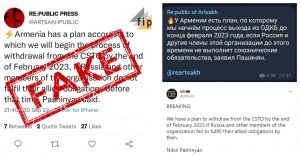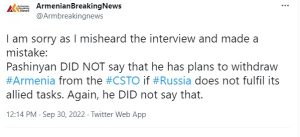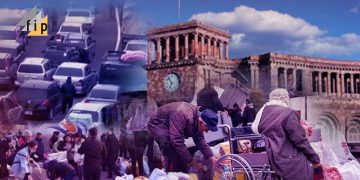On the evening of September 30, Prime Minister Nikol Pashinyan gave an extensive interview to the First Channel, the main topic of which was issues related to foreign policy, including the political atmosphere created after the September aggression of Azerbaijan, CSTO’s response to Baku’s aggression and the debates about it in the public domain of Armenia.
Before the press conference was over, information began to spread on Telegram and Twitter that allegedly Pashinyan stated in the interview that according to the existing plan, “Armenia will start the process of withdrawing from the CSTO in 2023, if Russia and other members of the organization do not fulfill their alliance commitments.”
Re:public of Artsakh Telegram channel, Twitter users @ARTSAKHPUBLIC, @301arm, @Armbreakingnews and others were among the first to spread the information.
Some of them later removed the post apologizing for the misinformation.
The spreading information is false as Nikol Pashinyan did not say such a thing in his interview. We quote the full question-and-answer session on the issue of CSTO membership.
Question: Since May, 2021 when Azerbaijan invaded the sovereign territory of Armenia for the first time, we appealed to the CSTO. We appealed to CSTO after the recent events. You are aware of the great public discontent with CSTO’s disproportionate response and the debates related to it. Is Armenia going to withdraw from CSTO?
Nikol Pashinyan: “You know, I have to say that recently following communication with a number of partners of the CSTO, I noted that the CSTO also noted that certain public sentiments in Armenia have grown very rapidly and by big steps. And it was even stated during a conversation that there is a concern in the CSTO that Armenia will leave the CSTO. But I responded that in Armenia, on the contrary, there is a concern that the CSTO will leave Armenia. In fact, this is not merely a wordplay, it has a very serious content.
Ultimately, let’s not forget that I am the Chairman of CSTO. And the Chairman of CSTO, in the same person, should have explanations for the Prime Minister of Armenia. You see, this is a very complex situation. And with an apparent wordplay, I formulated all the problematics.
Most importantly, we expect a clear political qualification of the situation. And I want to remind you of a delicacy. I have spoken many times at the working level, but I think now it is pertinent to speak about it publicly. For instance, when we previously had discussions with CSTO partners about the security of Armenia, because the CSTO is the number one institutional security instrument of Armenia, we received very clear assurances that the border of Armenia is a red line for the CSTO. When the events of Sotk-Khoznavar took place last year, we naturally appealed to the CSTO and we received a very odd response that the border, you know, is not demarcated or delimited. This begs the question, then where does the red line pass? Even then, we clearly formulated the need for a clear answer to this question.
This is important not only for Armenia, but also for CSTO, because to say that there is no border between Armenia and Azerbaijan is to say that there is no Collective Security Treaty Organization, because CSTO has a zone of responsibility that is marked by borders. If there is no border, then there is no zone of responsibility, then there is no responsibility, then there is no organization.
But I want to tell you the following: it is not that the border between Belarus and Russia is demarcated, the border between Azerbaijan and Russia is also not demarcated.
Now that Azerbaijan claims that the border between Armenia and Azerbaijan is not demarcated, and the border situation is tense because of that, it means that, for example, theoretically, Azerbaijan can also invade the territory of the Russian Federation or the Russian Federation can invade the territory of Azerbaijan, and when asked what is happening, they can say that the border is not demarcated. And there are problems in many countries, including CSTO.
But I want to tell you something else. Is there a border between Armenia and Azerbaijan? Yes, there is a border between Armenia and Azerbaijan, and those borders are known by coordinates, and those borders are the administrative borders of the Soviet Union, which by the agreement of December 18, 1991, ratified by both the parliaments of Armenia and Azerbaijan, those existing borders were defined as state borders.
This is the whole problematics. Armenia… When they ask whether Armenia will leave CSTO or not, it is a wrong wording of the question. The question is: will the CSTO leave Armenia or not, or will the CSTO fix its zone of responsibility, its red line in Armenia?
Question: Yesterday you welcomed Stanislav Zas. We are aware that a mission has come to Armenia. What did that mission do here? How would you rate the effectiveness?
N.P. You know, the Secretary General of the CSTO is a position that fulfills the task of the collective security council to come and assess the situation on the ground and present its assessment. We had a meeting yesterday and he presented what conclusions he had reached. I presented our remarks and recommendations in the context of those conclusions. You know that now the decisions are mostly made not by the Secretary General of the CSTO, but by the CSTO Council and it depends on the assessment of the Council, where we have our recommendations and remarks, of course. But it is very important whether the CSTO will formulate a clear political qualification on this situation or not.
In other words, the act of aggression against Armenia should be recorded, and a clear road map for the elimination of the act of aggression should be presented. And thus, it should fix the red line, which is de jure fixed, which is the cornerstone of the CSTO. If someone comes to the final conclusion that there is no border between Armenia and Azerbaijan, although there is no basis for such a conclusion, but if someone makes such a statement, he will state that there is simply no Collective Security Treaty Organization.
Thus, when answering the questions about the expediency of the CSTO membership, Nikol Pashinyan did not make a statement about Armenia’s withdrawal from the organization, let alone mentioning any dates or plans.
Lusine Voskanyan
Hakob Karapetyan

 FACTOMETER
FACTOMETER












